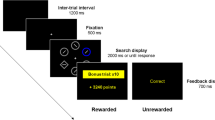Abstract
Permitting subjects to choose materials to be learned on a task enhances performance on that task. These results support the idea that choice increases the learner's perception of control, thereby enhancing motivation and performance. The purpose of the present experiments was to determine whether choosing responses to be learned on a paired-associate task would also benefit performance on a reaction-time task. Half of the subjects selected their responses to be learned on a paired-associate task while the remaining subjects were assigned responses. In one experiment, subjects then performed both the PA and RT tasks simultaneously, while in the second experiment the RT task was performed following the choice/force procedure. Providing the learner with the opportunity to choose produced a generalized increase in motivation, which resulted in significantly faster responding on the nonchosen RT task. Also discussed are the limitations of the effects of perceived control.
Similar content being viewed by others
References
Bailey, S. E., Perlmuter, L. C., Karsh, R., & Monty, R. A. Choice for others and the perception of control.Motivation and Emotion 1978,2 191–200.
Brigham, T. A. Some effects of choice on academic performance. In L. C. Perlmuter & R. A. Monty (Eds.),Choice and perceived control. Hillsdale, New Jersey: Erlbaum, 1979.
Kahneman, D.Attention and effort. Englewood Cliffs, New Jersey: Prentice-Hall, 1973.
Kraut, A. G., & Smothergill, D. W. A two-factor theory of stimulus-repetition effects.Journal of Experimental Psychology: Human Perception and Performance 1978,4 191–197.
Monty, R. A., Geller, E. S., Savage, R. E., & Perlmuter, L. C. The freedom to choose is not always so choice.Journal of Experimental Psychology: Human Learning and Memory 1979,5 170–178.
Monty, R. A., & Perlmuter, L. C. Persistence of the effects of choice on paired-associate learning.Memory and Cognition 1975,3 183–187.
Monty, R. A., Rosenberger, M. A., & Perlmuter, L. C. Amount and locus of choice as sources of motivation in paired-associate learning.Journal of Experimental Psychology 1973,97 16–21.
Perlmuter, L. C., & Monty, R. A. The importance of perceived control: Fact or fantasy?American Scientist 1977,65 759–765.
Perlmuter, L. C., Monty, R. A., & Cross, P. M. Choice as a disrupter of performance in paired-associate learning.Journal of Experimental Psychology 1974,102 170–172.
Perlmuter, L. C., Monty, R. A., & Kimble, G. A. Effect of choice on paired-associate learning.Journal of Experimental Psychology 1971,91 47–53.
Savage, R. E., Perlmuter, L. C., & Monty, R. A. Effect of reduction in the amount of choice and the perception of control on learning. In L. C. Perlmuter & R. A. Monty (Eds.),Choice and perceived control. Hillsdale, New Jersey: Erlbaum, 1979.
Taylor, J. D., & Kimble, G. A. The association value of 320 selected words and paralogs.Journal of Verbal Learning and Verbal Behavior 1967,6 744–752.
Wingfield, A., & Sandoval, A. W. Perceptual processing for meaning. In L. W. Poon, J. L. Fozard, L. S. Cermak, D. Arenberg, & L. W. Thompson (Eds.),New directions in memory and aging: Proceedings of the George Talland Memorial Conference. Hillsdale, New Jersey: Erlbaum, 1980.
Author information
Authors and Affiliations
Additional information
This research was supported by the U.S. Army Research Office, Durham, North Carolina, and the U.S. Army Human Engineering Laboratory. This paper may be reproduced in full or in part for any purpose of the United States Government.
Rights and permissions
About this article
Cite this article
Perlmuter, L.C., Scharff, K., Karsh, R. et al. Perceived control. Motiv Emot 4, 35–45 (1980). https://doi.org/10.1007/BF00995928
Issue Date:
DOI: https://doi.org/10.1007/BF00995928



